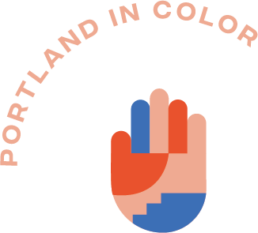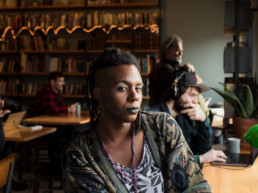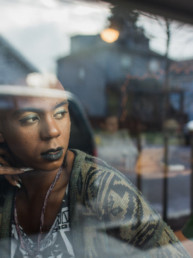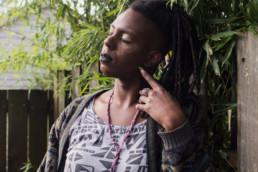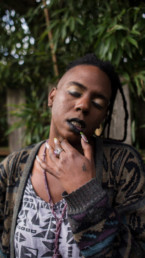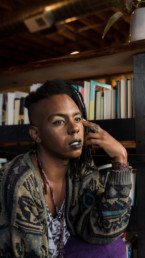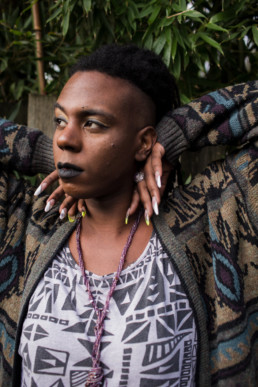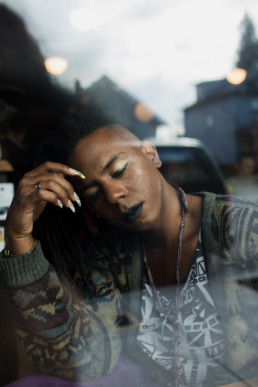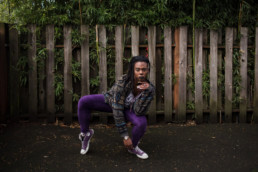JAYY DODD
“Any intentional POC space that does not note Blackness as important, and Indigenousness, [is] not a place I can feel safe in.”
Name: jayy dodd
Pronouns: she/they
Medium of choice: Writing, music, and photography and film as self-documentation mediums.
Karaoke jam: “Tell Me Something Good” by Chaka Khan. “Say My Name” by Destiny’s Child. “Work it out” by Beyonce.
Local artists you’re excited about: Melanie Stevens, Ahsante Sankofa Forsee, Ariella Tai, Samiya Bashir, Maximiliano, Mercedes Orozco, Jamali Maddix, David Granfield of the House of Flora, Father Fannie, my nail tech Camille, Bouton Volanté, and Sika Stanton.
How can Portland support you and/or your community?: Coming out to the spaces I make. I’m going to be making a ton of spaces, mostly for writing but also for visual art-making and performance, so I just want people to show up in spaces they feel good in.
WEBSITES
www.jayydodd.net
patreon.com/deyblxk
soundcloud.com/deyblxk
INSTAGRAM
@deyblxk
@jazzelle_jamez
TWITTER
@deyblxk
jayy dodd’s work is a universe. Her projects are entire worlds and her projects are small galaxies of sparkle—shining and interconnected. The artist is not confined by form or scope, and her vast body of work—layered, multi-dimensional, and spanning writing, music, and film, amongst other mediums—is the proof. Although she is new to Portland, she isn’t new to manifesting whole, immersive artistic spaces here (or anywhere else.) The city is lucky to have landed in her orbit.
“My work informs how I’m able to see myself more than the other way around. I look to my work to see what was real then.”
What is your background?
“Background” feels like some interior someone might not be able to see. There are things you may not know by looking at me, sure, but I don’t live that. Nothing that someone can’t see on me usually benefits me, so when I think of “what’s your background,” it’s “what do I need to tell you to convince you I am enough.”
That’s not the case here. But I’m first-generation Californian. My parents have roots and were born in Louisiana and Texas. I come from a very Christian, Southern family. My parents are both ministers. I’m an only child and I went to boarding school when I was 15 in Connecticut, and then I went to college outside of Boston at Tufts. I studied sociology and dance and I was in a capital ‘F’ Frat.
I graduated, worked at a non-profit for a year, organized Black Lives Matter Boston, did some protests, got beaten by police, couldn’t leave my house for a while, created a rap album, and started writing poetry again. I became an artist and, after that, a full-time teaching artist.
You mentioned studying dance. Do you still consider it one of your mediums?
I was beat up by police and have chronic pain, so I literally cannot dance for as long. I do not claim dance in a certain way anymore because I know what it takes to have dance as part of my art practice. I do not have it in me now. [But] I don’t feel like I’m denying parts of myself.
I use dance. Every song I’ve made, I have a dance for. I use footage of dance and definitely feel like I’m choreographing when I’m film editing, but so is writing poems. I can stage a two-hour dance show right now based on things I’ve had sitting, [but] time. Money. People. [With] film and books, I can act on it in a different way.
There are so many other artistic avenues I can idealize and manifest. I think I would be ungrateful if I was like, “Ugh, but I can’t dance!” I was upset about it for years, but then I got seen and held for my writing differently than I ever had for dancing. Fundamentally, being a writer and literary performer is much better for me than having my body navigated. That’s navigated all day regardless.
You say you are a "volunteer gender-terrorist" in your bio. Tell us more.
Each part of it is what it is. Volunteer as in I am signing up to be alive in the world every time I leave my house. And if you read through gender, I’m volunteering by choosing to rupture what my body is. Terrorist is everyone looking at me like I just fucking stole their lunch money because I’m wearing whatever I have on—high femme, low femme. I created that name out of what it feels to be alive.
What’s your artistic process like when deciding which medium to use? How do you know when to run with the ideas you have?
I try to be in conversation with myself as much as possible. Much of my work is self-referential and in conversation with some exterior. You may not get that [from one piece], but if you read this other thing, you’ll get it. The further into my work you get, [the more] able to see all these huge ass threads and larger arcs I cultivate over several works.
For the longest time my music and writing existed separately; two separate acts. And they were, but I saw it in a really different way. With my first book, writing was the only thing keeping me together. Once I left Boston and went to Detroit, I had all the time, was teaching my workshops online, and trying to not kill myself every day.
I was writing my second book about being exiled. [It’s] called The Black Condition ft. Narcissus and I was just mirroring in this character, story, life. I got accused of being narcissistic and it was used against me in that I was demanding too much.
In the [Greek] story, Narcissus is born a demi-god. His mother takes him to an oracle and he’s like, “Your kid’s gonna be the shit, but he can never see himself or it’s over.” He lives his whole life with people fawning over him and he never knows why. [Later], Narcissus catches a glimpse of himself then goes to the river to try and see what he saw. He dies there, trying to see himself.
When I got accused of being a narcissist, I had to unpack what that actually meant. I was writing the book, and then I was like, “I need to see this,” and made the film. Then I made a soundtrack for the film which ended up being a 14-track album. Needing to process the accusation turned into a book, film, and soundtrack which just told me I could do everything.
I understand from Duende you are in a state of transition. From having become sober to moving across the country to your physical body. How does that impact how you view your works past and present?
My work is one of the best ways to trace my transition—especially film. There’s a lot of boy footage. I can see, “You’re a boy,” and “Oh, no you’re a woman.” Even the parts where I’m nude—I can still tell. When I go back and see videos from college dances, I’m moving differently. My work informs how I’m able to see myself more than the other way around. I look to my work to see what was real then.
I separate my sobriety from my work completely because it’s for me and the only thing it’s made me do is live better. I remember I was scared to write sober. I wish I could say I’m writing better, but I don’t think I can say that! I wasn’t drinking to write. I was drinking to be alive. Being alive is sometimes harder being sober, but I I’m not sure how it’s affecting my art. It doesn’t seem to be hurting it, by any means.
How do you think Portland might inform your sense of community or your work?
I think I’m going to have better every days and much more collaborative art. But there’s a certain Portland “POC” community that I definitely do not want to be a part of in terms of art collaboration because of that language. Any intentional POC space that does not note Blackness as important, and Indigenousness, [is] not a place I can feel safe in.
I’m going to go wherever and be out and about, but the way that I’ve heard and have experienced POC in Portland has felt really anti-Black to me. Even when people of color come to my shows, the way they talk about my work erases its specific Blackness.
What I’m starting to learn about myself is that I’m going to build community outside of my art. Non-artists don’t hold me as an artist—they hold me as a person. Some artists can and that’s great and I have some of that, but a lot of my real friends are not artists. I also believe we all get community wrong and expect too much of others and too little of ourselves.
You mentioned the film project you're currently working on. What's next?
I’m ghostwriting and have acquired beats from Black queer trans producers and DJs. I think I want to do another rap album, but I’m taking a music break.
March is when my book comes out. I’m also launching a new literary project in April. The digital hub will have prompts, lessons, and an advice column, and the IRL portion will be workshops, a reading series, and more stuff nationwide called DoveSong Labs. I had been working with [Winter Tangerine] for the last three years doing online workshops and I’m bringing live ones here in the fall.
I’m also working on this fictional world called Domestikkk. It’s set [60 years from now]. The “American project” has failed. The whole government is overrun by white militia. The biggest export becomes digitally-created media, or fake news. It’s sort of what I imagine [will] happen. I’m also doing a film—a corrupted video file from the [book’s] “information wars.” I’m going to rewrite spirituals for a choir to sing and that’ll be the musical project.
I’m so happy to be alive. I moved here on a kind of faith, but not a blind one. There have been a few weird notes, but the song—being my time here—still bops.
